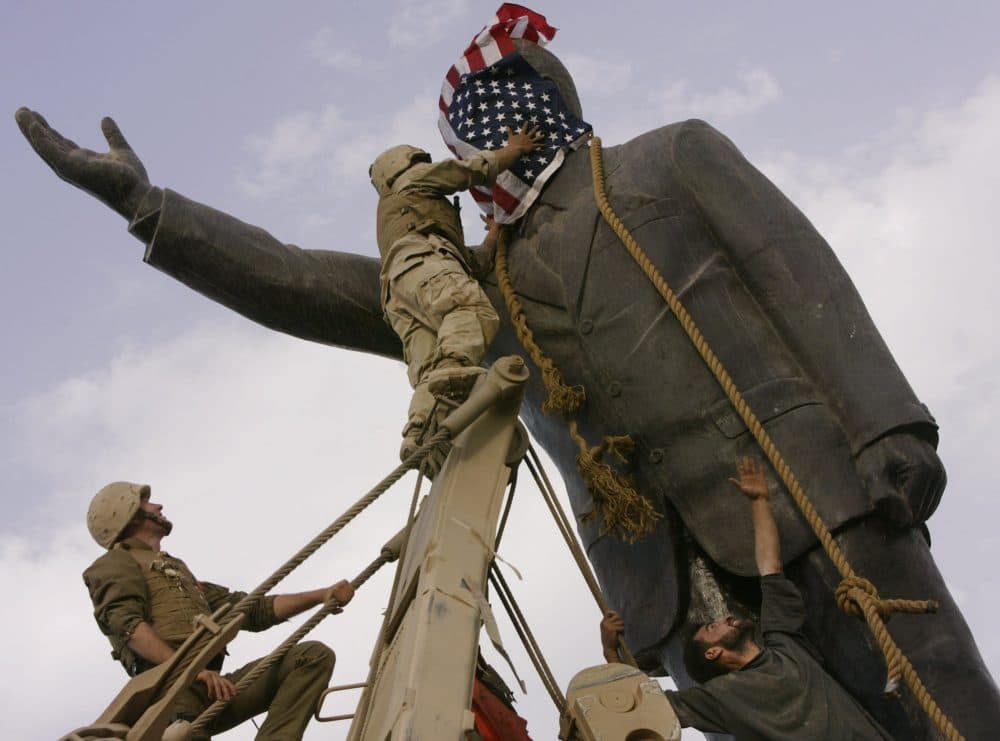Advertisement
Are We Safer? Measuring The Costs Of America’s Unending Wars

In the immediate aftermath of the hijacking of four aircraft and the attacks on New York and Washington on Sept. 11, 2001, which killed nearly 3,000 people and injured twice that many, the Bush administration warned that the U.S. should prepare for a war of uncertain duration, for the "foreseeable future."
On Dec. 16, 2001, President George W. Bush said: "This crusade, this war on terrorism is going to take a while. And the American people must be patient... It is time for us to win the first war of the 21st century decisively, so that our children and our grandchildren can live peacefully into the 21st century." Two days later, the president signed the Authorization for the Use of Military Force (AUMF), which set essentially no limits to the emerging war on terror.
We can't kill our way to peace and security, or we might have done it already.
The goal of the global war on terror is to prevent future terrorist attacks, and, we are told, the way to do that has been to destroy terrorist organizations and kill terrorists.
A measure of progress would be the reduction of the number of people pledged to attack the American people and their allies and the reduction in the geographic scope of areas controlled by militants. In February of this year, U.S. Director of National Intelligence James Clapper estimated that more than 35,000 foreign fighters traveled to Syria to join the Islamic State since the war began there in 2012. And U.S. General Joseph Votel told the Senate Armed Services Committee in January of this year that 20,000 to 40,000 insurgents remain in Afghanistan. The U.S. doesn't do body counts anymore, so we can't know how many thousands of proven or suspected "terrorists" have been killed in these wars. We do know that Afghan, Pakistani and Iraqi civilians have been killed too. Tens of thousands of them.
And are we safer in the U.S.? The Boston Marathon bombers killed three spectators; two shooters in San Bernardino killed 14; and one shooter in an Orlando nightclub killed 49 people. Others who are self-radicalized or directly linked to militants abroad have killed Americans at military installations in the U.S., including Fort Hood, Texas.
To the extent that we can understand their complex motives, some of these killers say that they were reacting to the deaths of innocents at U.S. hands in Iraq, Syria, Afghanistan and Pakistan. That might be true. But whatever the case, we need to ask questions about the most effective way to stop terrorism.
If we just look at the money involved, a partial reckoning suggests that these wars are extremely expensive in direct costs.
Here is a partial list of the costs of America's wars from September 2001 through today:
- Estimated economic consequences of 9/11 attacks on U.S. economy: $109 billion
- Afghanistan/Pakistan War by Defense and State departments: $805 billion
- Iraq and Syria War by Defense and State departments: $822 billion
- Operation Noble Eagle (defense of U.S. bases, airports and airspace): $28 billion
- Other War-Designated Funding: $102 billion
- VA Medical Spending for Iraq and Afghanistan War Veterans: $38 billion
The total direct costs of these wars, as enumerated above, are already staggering, totaling approximately $1.8 trillion.
Of course, the figures above do not include all of the grim economic costs of these wars. For example, the survivors of each of the 6,858 United States uniformed soldiers killed since these wars began are entitled to $100,000 in death gratuities. So far, this is more than $685 million that comes out of the regular Pentagon budget. The survivors of the additional 21 dead civilian Pentagon employees and the thousands of private contractors who have been killed while working for the U.S. in these war zones also receive benefits. And there are additional costs for disabilities and lost wages.
Despite the issuance of Patriot Bonds for 10 years after the 9/11 attacks, almost all of the costs of these wars is borrowed. The U.S. is paying the interest on that debt, and has already paid more than $400 billion in interest on just the military and State Department's war-related spending.
The point is that even when we do a partial accounting of the economic costs of these wars and look at the scope of the problem, it is not clear that this is money well spent. Given these huge dollar costs, not to mention the human toll in lives lost and bodies injured, it is also not clear whether these wars abroad are the most effective — or even an effective — way to fight terrorism.
Every war must end. And we need a plan.
Every war must end. And we need a plan. There are three steps the Congress, the Pentagon, the State Department and the National Security Council should undertake immediately as part of the coming political transition, no matter who wins the Congress or the White House come November.
1. Undertake a comprehensive evaluation of the war's costs and consequences, including the human toll, the budgetary costs, and the consequences in terms of terrorist attacks implemented and thwarted.
2. Discuss the likely costs, risks and consequences of a continuation of the current policies into the indefinite future.
3. Develop alternative policies and compare their costs, risks and consequences to the current doctrine and policies.
We need the most experienced and — if this is not a contradiction in terms — the most creative people in government and outside it to take stock of where we are in the war on terror. We can't kill our way to peace and security, or we might have done it already.
We can't kill our way to peace and security, or we might have done it already.
